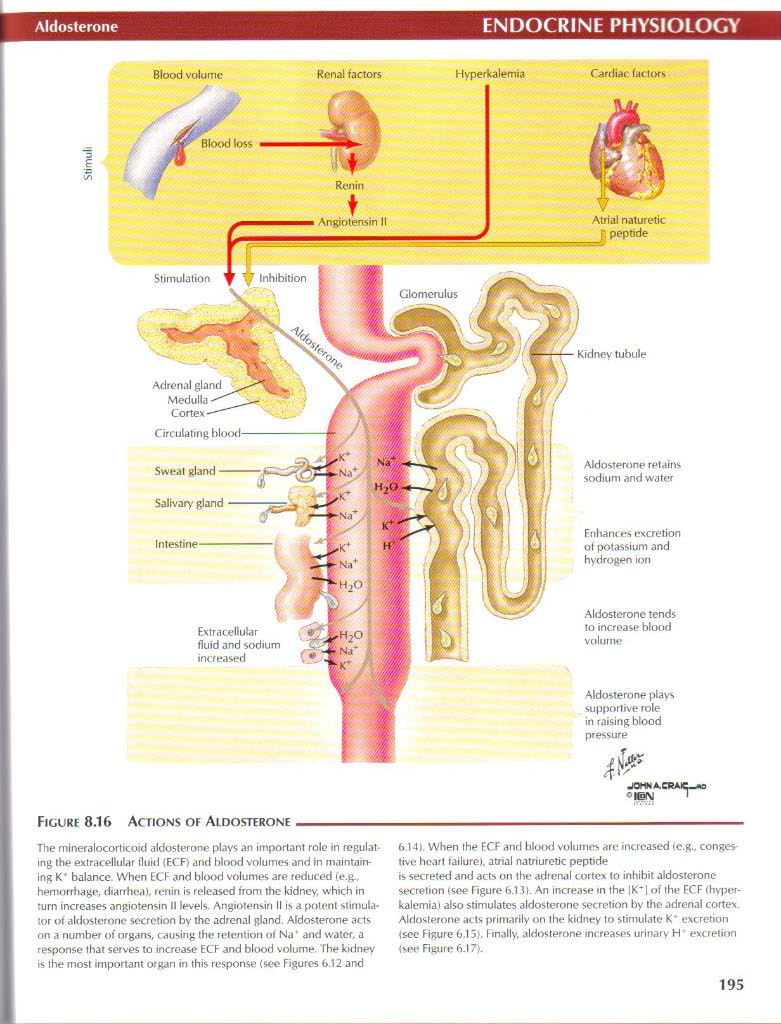netter176

Aldosterone
ENDOCRINE PHYSIOLOCY
Blood volumc
Renal factors
Hyperkalemia Cardiac factors

Fnhanc.es excretion ot potas$ium and
hydrogen ion
Aldosterone plays supportive role in raising blood pressure
Atrial naturetic peptide
Adrenal gl
Circulating blood Sweal gland Salhrary gland
Intestine-
J0HNA.CRAie_M3
Figurę 8.16 Actions of Aldosterone
The mineralocorticoid aldosterone plays an important role in regulat-ing the extrac ellular fluid {ECF) and blood volumes and in maintain-ing K" balance. When ECF and blood volumes are reduced (e.g., hemorrhage, diarrbca), ronin is released trom the kidney. which in tum inereases angiotensin II levels. Angiotensin II is a polent stimula-tor of aldosterone secretion by the adrenal gland. Aldosterone acts on a number of organs, causing the retention o i Na * and water, a response that serves to inerease ECF and blood volume. The kidney is the most important organ in this response (see Figures 6.12 and 6.14). When the ECF and hlood volurnes are inereased (e.g., conges tive heart failure), atrial natriuretie peptide is secreted and acts on the adrenal cortex to inhibit aldosterone secretion (see Figurę 6.13). An inerease in the |K*| of the ECF (hyper-kalemia) also stimulates aldosterone secretion by the adrenal cortex Aldosterone at is primarily on the kidney to stimulatc K‘ excretion (sec Figurę 6.15}. Finally, aldosterone inereases urinary H‘ excretion (see Figurę 6.17).
195
Wyszukiwarka
Podobne podstrony:
netter189 ProlactiENDOCRINE PHYSIOLOGY Prolactin-inhihiting factor (PIF), thought to bc dopamine, mo
netter69 CARDIOVASCULAR PHYSIOLOGYCirculation to Special R<-(*ions Brain: blood (Iow normally rem
netter89 RESPIRATORY PHYSIOLOGY Pulmonary Circulation Distribution of Pulmonar> Blood Flow
59840 netter71 CARDIOVASCULAR PHYSIOLOCY Short-Term Regulation of Blood Pressure 2/3t „NE Ganglion-
netter124 GASTROINTESTINAL PHYSIOLOGY Lowrr Esophageal Sphincter mm Mr Normal LES tonę is physiologi
netter132 GASTROINTESTINAL PHYSIOLOGY Appetite and Hunger Smell I Vcntomcdial hypothalami .offood 1
netter140 GASTROINTESTINAL PHYSIOLOGY Smali Intestinc Structure: III Mitochondria Tight junctions ■
netter145 DetecationGASTROINTESTINAL PHYSIOLOGY Certam physiologic. events, as arising (orthocołir r
więcej podobnych podstron